Bob Woodward on ‘Obama’s Wars’
The veteran journalist talks to Truthdig's James Harris about his new book, which zeroes in on a war-averse president struggling to impose order on chaos abroad without losing his grip on the home front.The veteran journalist talks about his new book, which zeroes in on a war-averse president struggling to impose order on chaos abroad.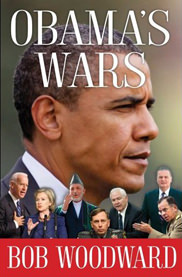
The veteran journalist talks to Truthdig’s James Harris about his new book, which zeroes in on a war-averse president struggling to impose order on chaos abroad without losing his grip on the home front.
Note: Transcript below.
{g_podcast_box}
Transcript:
James Harris:
Welcome to Truthdig. James Harris along with “the legend,” they call him: Bob Woodward, the man who broke the story that put Richard Nixon out of business. But we’re here today to talk about his new book, “Obama’s Wars.” Bob, thank you for joining us on Truthdig today.
Bob Woodward: Thank you.
JH: I read your book last night. I bought a copy at the local Barnes & Noble. I think it’s …
BW: They didn’t send you one? They should have.
JH: They did, they did. But you know what, I left that copy on a plane, and I said you know what, I need to reference some quotes, so I went and picked up a copy. I want to say, I felt like I was in the room; I got the sense I was watching a current play unfold. What was the most important piece for you?
BW: The focus is the war in Afghanistan; the secret war, Pakistan; and then the war on terror. And this is … it tracks in microscopic detail, or as somebody said, “spreadsheet-like detail,” the 19 months that President Obama walks in dealing with and making decisions in these wars. And so you see him as a kind of law professor, questioning people, identifying issues, being skeptical. You also see his emotions; he erupts a number of times. You see the dilemma of the war, you see the intransigence of the military that will not give him other options. And he goes to the … I guess the most important part, he gets to the heart of the matter, and that is that the cancer in this war is really in Pakistan, where the safe havens for al-Qaida exist, where the safe havens for the Taliban leadership that is fighting us in Afghanistan. And they have sanctuary in Pakistan in cities and camps, and so they can train their fighters, re-equip them, and then give them actual, you know, weekends—rest and relaxation—and then send them back over the border into Afghanistan to kill American soldiers. And Leon Panetta, the CIA director, is quoted in the book saying this is a crazy kind of war, and it really is crazy.
JH: It seems to me that as we’ve watched this war, it was about al-Qaida, then it became about the Taliban. What did you learn from the administration, as you wrote this book, about the distinction between the two?
BW:
That’s a really good question, because it’s so confusing it can make your head hurt.
JH: Yeah.
BW: Al-Qaida attacked us on 9/11. They were then … they had their sanctuary in Afghanistan. We invaded Afghanistan, drove them out, they went across the border into Pakistan. And as President Obama learns two days after he’s elected president, the intel people tell him, “Look, Pakistan is living a lie; they fight some of these terrorist groups, and at the same time they secretly created some of them and support them.” And right now, in the fall of this year, a lot of these groups are plotting to attack the United States. The Times Square would-be bomber, back in May—he was trained and supported by one of these Pakistani terrorist groups. And Obama, when he’d looked at all the intelligence, sent his national security adviser and CIA director over to Pakistan to read them the riot act, and said, “You’ve got to do more about these sanctuaries.” And the intelligence on who’s plotting and how many plots there are and how difficult it is to track them will make your hair stand on end.
JH: I feel like there’s a football that’s a-fumblin’, and we can’t put our hands on it. ’Cause it was Iraq, and now it’s Afghanistan, and now it’s Pakistan, and we are over there just making a mess of matters. Did that ever come up?
BW: Yes—whether we’re causing as many problems as we are solving. This is the difficulty of this war, and what I’ve tried to do here … it’s a window on the way President Obama thinks. Though we … people learned a lot about him in the 2008 campaign, he gives lots of speeches, he does town hall meetings, he answers reporters’ questions … the message management in this White House has been so good I think you really don’t know who he is. And what I’ve got are thousands of words of him being quoted, trying to figure out what to do. You’re right—it’s kind of a football that’s still flying around in the air and on the ground, and it’s not clear how to jump on it and get control of the situation. There are so many unsettled components of it. I mean, let me just take one. The secretary of defense, Bob Gates, a critical player by most accounts, has done a good job as secretary of defense; he was a holdover from the Bush administration, agreed to stay one year. I recount seeing where Obama called Gates in last year and said, “I want you to stay for the whole term,” for four years. And Gates feels pre-empted, feels that the president enters into a negotiation with him, and that the president sounds like a rug merchant. And they go back and forth, and Gates agrees to stay for another year, but psychologically he’s got one foot out the door. You know in any institution when the leader is about to leave, or thinking about life after the Pentagon, in this case, it’s not clear where things are going. That’s something that has to be settled. The national security adviser, Gen. [James] Jones, is leaving; who’s going to take that job? How do you make the National Security Council a more functioning entity? The head of intelligence, Adm. [Dennis] Blair, was fired in the spring; they’ve got a new man in Gen. [James] Clapper. How are the intelligence agencies functioning? The rift between the political White House and the military is as clear as it has ever been. The news on the ground in Afghanistan about how the war is going is … though they say there’s some progress, there’s a lot of bad news here. So, we are at a point where the president in the next year is going to have to make probably the most critical decisions in this war, which will define not just an important part of his presidency and his leadership, but will define the position of the United States in the world. Do we do well in this war? Are we smart? Or, as Vice President Biden worries all the time, do we wind up stuck with Obama’s Vietnam?
JH: And there are a lot of comparisons. You talked to him [Obama] on that day for an hour and 15 minutes, and he said at the end, “ ‘War is hell.’ And once the dogs of war are unleashed, you don’t know where it’s going to lead.” And the situation you just described is kind of where he is right now. He’s in the middle of chaos.
BW: This is the president. When I talked to him, you could just see, again one of these things, you … he just does not like war. He says at these meetings, “This needs to be a plan about how we’re going to hand it off and get out of Afghanistan.” There cannot be any wiggle room. He wants out. You’re exactly right to land on those quotes. He does not like war. He says the job he has as commander in chief is imposing order on the chaos of war.
JH: Everything’s online nowadays, right? So I’m reading a hundred praises of your book, and then I go to The Huffington Post and Russ Baker. He’s very critical of how you handled it. These guys all wanted you to take up arms and charge Obama and charge Afghanistan. First I’d ask: Why didn’t you? And then I’d ask, after you answered that: Why do you think they want you to?
BW: People react differently to this. Look, this is a neutral inquiry. It’s factual and documented, you know; it isn’t something where one guy in the hall one day said the following … [this takes] the exact quotes from notes, and contemporaneous recollections of firsthand witnesses, and so forth. And an interview with the president, and just a whole … so, some people are going to like it, some people are not going to like it. Some people say Obama comes off very well and strong; others say no, he’s a catastrophe. You know, welcome to American politics. And you know, when Obama says the dogs of war, when they’re unleashed you lose control—one of the dogs of war is this … varying assessments and judgments that people are going to make. But at least the record is out there, in detail, and you can see who he is. Somebody I know in the intel, intelligence, world read it, and he deals with Obama, and he said, you know, it quadruples my knowledge of exactly what his values are, how his mind works, some strengths and some weaknesses.
JH: At the end of your note to readers, you say, “Given the diversity of sources, stakes and the lives involved”—as you just talked about here—“there is no way I could write a sterilized or laundered version of this story.” It seems as you were writing that note you were prepared for that criticism. So as you wrote that, why did you include that tidbit?
BW:
Well, that’s a good question. It’s, in a sense, a note to sources, you know, where people … and I say, people will tell you things off the record, or say I don’t want this in the book, and think that they can sterilize what happened or kind of lock away the truth. And I’m going to find other sources or documents to put the story out. And because of personalities involved here, some that I’ve known for a long time, you can’t let people have immunity or veto power; you’ve got to lay it out. And that’s what I’ve done here, tried to do.
JH: So some final thoughts on this topic of Afghanistan. Because you bring much more perspective than a great many people, Bob Woodward, legendary journalist that you are, but also because of your age and your perspective. You understand the implication of where we are in Afghanistan.
BW: Now, I’m old, but I’m not that old. [Laughter] I was in the Navy during Vietnam, in the U.S. Navy.
JH: But that would count as living through, right? You lived through, right?
BW: If somebody said what did you think of Grover Cleveland … [Laughter] I said I wasn’t born.
JH: I wouldn’t treat you that way, Bob. But you have this perspective on living through wars and on how media has covered them, and on how public sentiment changes throughout these things.
BW: Yeah.
JH: What are we doing in Afghanistan? What are we doing in the Middle East? Do you as a journalist believe that it’s a story that we will reflect upon as one worth telling, or that it will be a tragic story, because it really had no purpose?
BW: Well, you know, this is the great question. How is it going to be viewed by history? And of course we don’t know. But what we’re trying to do is stabilize the situation, protect American interests. And people define those interests very differently. I think President Obama—I mean, I don’t think, I know—he wants out of Afghanistan. He wants to avoid a war in the Middle East with Iran or some sort of war between … involving Israel. He’s … his heart and head is in his domestic agenda. Health care, building jobs, trying to improve the economy, energy issues, environment issues, and so forth. But this—it looms larger and larger. Particularly if there is a terrorist attack in this country. There’ve been precisely zero successful attacks since 9/11. When I talked to the president about this he said, you know, “One man, one bomb, going off in this country could traumatize the country.” And if it’s postmarked Pakistan, here is this country that’s politically unstable, they are our ally but they’re also providing these safe havens for the people fighting us in Afghanistan. The economic problems in Pakistan really are profound. A couple of million people pay taxes out of 170 million people. They’ve got a tradition of military coups. The most important powerful institution in the country is the military and the intelligence service. They have a hundred nuclear weapons. So, you know, strap yourself in. This is a big deal. And that’s why Obama has devoted so much attention to it.
JH: But his head is, as you said, on domestic policy.
BW: It is, but you know, he realizes the stakes here, and that he’s got the job of commander in chief, and so it’s on his watch. When I … I did four books on President [George W.] Bush, and at the end I came away with the feeling about Bush that the eight years had fatigued him. That being president in the age of terror, anytime the phone rings it could be, you know, look what happened in wherever it might be in the country. And it so stresses and puts on edge a human being that I wonder if somebody can really do it without getting into a state like Bush. I think Bush … when he left the presidency, I asked one of his aides, “What is he doing?” And the aide said, “George Bush is writing his memoirs and recovering from the presidency.”
JH: [Laughter] Because you go gray faster than any other profession in the world when you become president. You go gray, outright.
BW: Yeah.
JH: Now, how have the two years treated Obama? You talked about the eight years for Bush. How would you … how do you see him now? What are your honest …
BW: My, you know, that you’re going to, people are going to … this is the window into him. There’s no equivalent book or reporting about how he dealt with health care or the other issues in the White House. This is a march into his soul and his brain. And you can see exactly what he does. And, I mean, you said it at the beginning—you’re witness. You get to go to the meeting and see exactly what happened, verbatim, as the story unfurls. And people are going to have very different reactions, and they have already, but it’s the authentic portrait. It’s like you go to a long movie and some people will come out and say, well, it means the following, and somebody else, oh no, it means the opposite, or it’s a good movie or it’s a bad movie. This is the Obama movie.
JH: And we’ll leave it at that. Bob Woodward, thank you for joining us on Truthdig.
BW: Thank you.
JH: That’s Bob Woodward, author of the new book, “Obama’s Wars.” Pick up a copy. It’s a good read. For Bob Woodward, this is James Harris, and this is Truthdig.
Your support matters…Independent journalism is under threat and overshadowed by heavily funded mainstream media.
You can help level the playing field. Become a member.
Your tax-deductible contribution keeps us digging beneath the headlines to give you thought-provoking, investigative reporting and analysis that unearths what's really happening- without compromise.
Give today to support our courageous, independent journalists.

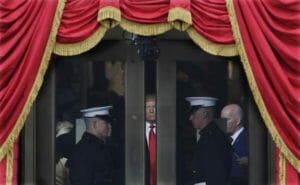
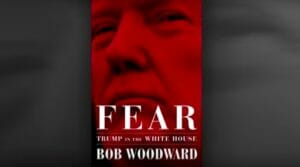
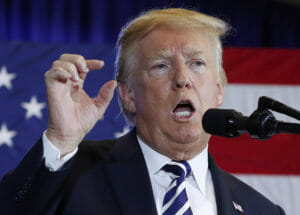
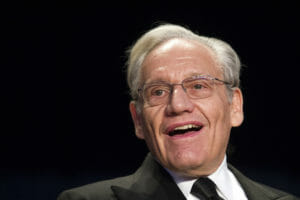

You need to be a supporter to comment.
There are currently no responses to this article.
Be the first to respond.